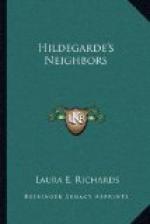CHAPTER II.
Old friends and new.
It did indeed seem that the advent of the new neighbours might make a great difference in Hildegarde Grahame’s life, if, as she hoped, they were the right kind of neighbours. She was an only child. She and her mother had lived now for two years at Braeside, a lovely country place which they had come to look on as home. Hildegarde was always happy, and was unconscious of any want in her life; but her mother often longed for another daughter, or a pleasant girl in the neighbourhood, to be a companion for her dear one. True, Hildegarde had one young friend, Hugh Allen, the ward of Colonel Ferrers, their kind and eccentric neighbour; but Hugh, though a darling, was a little boy, and could not “dovetail” into a girl’s life as another girl might. Perhaps Mrs. Grahame hardly realized how completely she herself filled Hildegarde’s idea of a friend and companion. The daughter was enough for her; her own life seemed full and running over with joy and work; but for the child she wanted always more and more. So her hopes, as well as Hildegarde’s, rose high when she heard of the pleasant-looking girls who had come to the next-door house. The house was a large, old-fashioned one; less stately than Roseholme, Colonel Ferrers’ house; less home-like and comfortable, perhaps, than Braeside,— but that might only be because it had been so long uninhabited, Hildegarde thought,—yet still pleasant enough, with its tall columns and broad piazza. The house was yellow, the columns white, and the cheerful colours were set off by the dark trees, elms and locusts, that bent over it and almost hid it from the road. A smooth stretch of lawn lay between the house and the hedge, through which Hildegarde and the Colonel had made their observations: a good lawn for tennis, Hildegarde thought. How good it would be to play tennis again! She had been longing for the time when Hugh would be big enough to learn, or when Jack Ferrers, her cousin, would come back from Germany. How surprised Jack would be when she wrote him that the yellow house was inhabited. What friends he might make of those two nice-looking boys, unless he took one of his shy fits, and would have nothing to do with them. Jack was a trying boy, though very dear.
With these things in her mind, Hildegarde was sauntering toward the Ladies’ Garden, on the day after the new arrival. This was a favourite haunt of hers, and she was very apt to go there for a season of meditation, or when she wanted to find Hugh. It was a curious place,—an old, neglected, forgotten garden, with high, unclipped box hedges, overhung by whispering larches. Hildegarde had dreamed many a dream under those larches, sitting beside the little stream that plashed and fell in a tiny rocky hollow, or pacing up and down the grassy paths. For the child Hugh, too, this place had a singular




